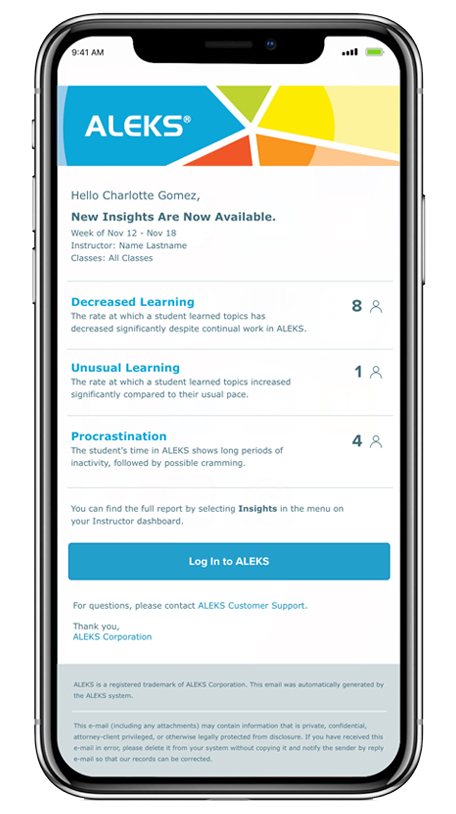My Account Details
McGraw-Hill Earns Prestigious Technology Award for New ALEKS Insights Tool
The innovative McGraw-Hill ALEKS tool will alert instructors to students at risk of failure, helping them intervene effectively

New York (December 18, 2018) – McGraw-Hill today announced that it has won a 2019 Digital Edge 50 award in recognition of its new artificially intelligent tool that uses machine learning to help prevent students from failing or dropping out of a course. The tool is part of McGraw-Hill ALEKS, an award-winning learning solution focused on math and chemistry.
Built in response to educator input, McGraw-Hill ALEKS research scientists, UX designers and user researchers created an artificially intelligent tool to analyze student performance data and developed a system of nudge alerts that go to instructors and point them to behaviors putting students at risk of falling behind or failing.
ALEKS Insights will be available as a new feature for K-12 and higher education courses beginning in mid-2019. The annual Digital Edge awards recognize 50 organizations for ongoing digital transformation initiatives that have significant, measurable impact on business.
"We are honored to be recognized among companies that have been leaders in the digital transformation of their industries," said Scott Virkler, Chief Product Officer for higher education at McGraw-Hill. "We built ALEKS Insights based directly on educator feedback, so we see this award as a clear demonstration of the effectiveness of our approach and commitment to building innovative technology that empowers educators and students."
ALEKS Insights provides instructors with a report about students who may be struggling or falling behind. From the tool, instructors can directly message students or view more detailed ALEKS reports to understand the issue.
The tool surfaces to instructors the following potential problem areas:
- Topics Failed: Content students have attempted multiple times without success.
- Learning Decreased: Students who show a significant drop in successful learning despite continuous time spent in the system.
- Unusual Learning: Students who show a significant increase compared to previous learning, which may signify students not doing their own work.
- Procrastination & Cramming: Students whose time spent in ALEKS varies, showing long periods of inactivity followed by high bursts of activity.
"By focusing the initial build on the needs of educators, this technology is able to deliver value quickly to a group that has asked for this kind of capability," Virkler said. "We take great pride in listening and reacting to our customer needs. It’s tremendously satisfying to see this acknowledgement of McGraw-Hill for our cutting-edge product development based on learning science."
McGraw Hill
McGraw Hill is a leading global education company that partners with millions of educators, learners and professionals around the world. Recognizing their diverse needs, we build trusted content, flexible tools and powerful digital platforms to help them achieve success on their own terms. Through our commitment to equity, accessibility and inclusion, we foster a culture of belonging that respects and reflects the diversity of the communities, learners and educators we serve. McGraw Hill has over 30 offices across North America, Asia, Australia, Europe, the Middle East and South America, and makes its learning solutions for PreK-12, higher education, professionals and others available in more than 80 languages. Visit us at mheducation.com or find us on Facebook, Instagram, LinkedIn, or X.
Contact
Tyler Reed
McGraw Hill
(914) 512-4853
tyler.reed@mheducation.com